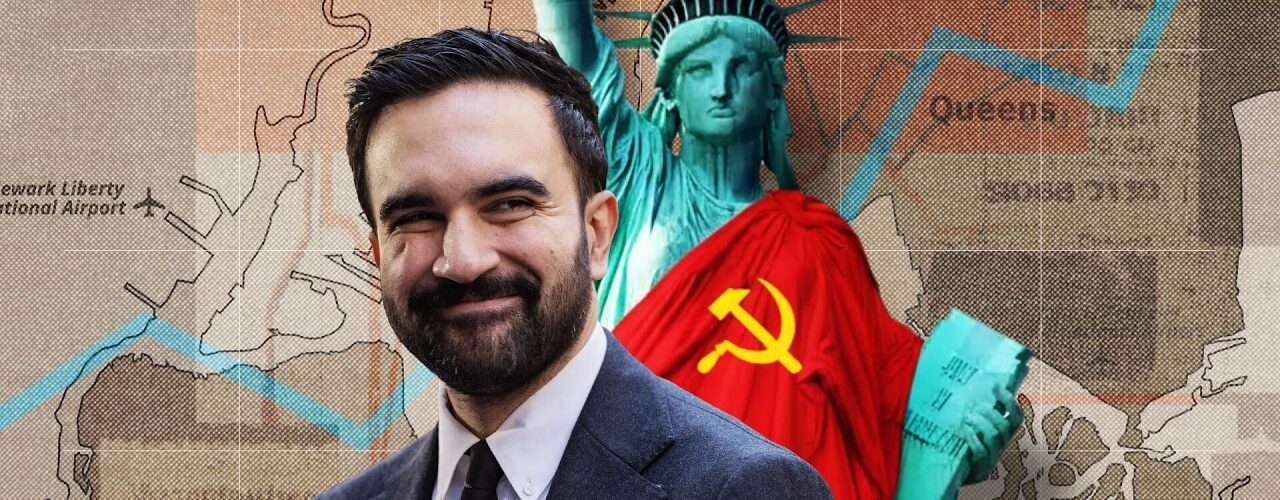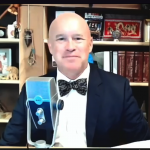New York City will likely elect a communist mayor today and Zach Weissmueller from the libertarian YouTube channel, ReasonTV wants to know why.
Speaking with libertarian-turned-conservative, Inez Stepman and referring to 20th century economists and intellectuals, Weissmueller says he’s come away convinced that the culture necessary to maintain a free society is slowly deteriorating. He also acknowledges that libertarianism, alone cannot maintain the culture that’s required for libertarianism to work.
“Libertarians can’t defend capitalism and freedom in the long run, because our belief system has a fatal flaw. It’s amoral – not immoral – but amoral, lacking a concrete set of values.”
Libertarianism grew out of America’s founding Protestant ethos that valued honesty, hard work, diligence and thrift but over 50 years ago, Irving Kristol understood that the libertarian understanding of justice once dominant in America was already fading and that the enemy of liberal capitalism was not so much socialism as it was nihilism.
Raised in a socialist, non-observant Jewish household, Kristol understood that the fading relevance of organized religion in liberal capitalist societies left too many people with a “God-shaped hole to fill” and that socialism exploited the human yearning for cosmic justice.
Kristol criticized libertarians, like Milton Friedman for failing to condemn the libertine aspects of the ’60s counterculture; drug use, promiscuity, the abandonment of family values, saying that libertarians prioritized individual “self-realization” as the goal of society.
But what if the “self” that is “realized” is a self that despises liberal capitalism and uses its liberty to subvert and abolish a free society?
This is the obvious concern of many about Zohran Mamdani. Inez Stepman refers to his “terrifying” meld of the same Third World resentments and elite/Woke views that have been turbocharging the Palestinian protests, epitomized by the incoherent signs proclaiming “Queers for Palestine”.
Zach Weissmueller says this broader ideology is what Venezuelan writer Carlos Rangel called “Third Worldism”, which rests on the idea that pre-colonial societies were a socialist paradise living in communal harmony before European imperialists came to pillage their lands and to impose savage capitalism and brutal individualism.
Third Worldism mobilizes moral outrage against colonialism and capitalism, while often absolving local leadership of responsibility for corruption, authoritarianism and poor governance.
Third Worldism conflates imperialism and capitalism, which Mamdani exemplifies when he claims that socialists and Palestinians are “fighting the same struggle”.
It’s hard to believe that Mamdani, who grew up rich in Manhattan, as part of the cultural elite and whose lavish 3-day wedding in Uganda last July cost an estimated $500,000 and who only became a US Citizen in 2018 is truly focused on improving the lives of low-income New Yorkers. Aren’t there enough poor people in Uganda or in India whose lives he could improve?
Embattled New York Attorney General Leticia James has been constantly at Mamdani’s side during his campaign appearances. Similarly to Tish James, Zohran Mamdani launched his campaign with promises to be Donald Trump’s “worst nightmare”, which is neither the primary concern of his consituents nor in their best interests.
Given the above and claims that Mamdani is a CIA asset who participated in the Arab Spring in Egypt and that his cellphone was GPS-tracked twice last June to Barack Obama’s mansion in the presence of cellphones belonging to leaders of the Muslim Brotherhood and to members of Iran’s Ministry of Intelligence, my guess is that Mamdani will use his position to marshal everything in his power to continue the administrative and judicial coup against Donald Trump.
TRANSCRIPT
Zach Weissmueller: I’m worried about what Zohran Mamdani means for America.
(Roll video)
Zohran Mamdani: I’ll freeze the rent for millions of tenants, make buses fast and free, and deliver universal childcare. And before you ask, I’ll pay for it by taxing the rich.
Zach Weissmueller: In some ways, Mamdani, who’s a self-proclaimed Socialist, doesn’t sound that different from other progressive Democrats.
(Roll montage)
Kamala Harris: We will take on corporate landlords and cap unfair rent increases.
AOC: It’s time to stop protecting billionaires.
Inez Stepman: Every single thing he says, even right down to, you know, that there shouldn’t be any billionaires, is merely an extension of what Elizabeth Warren has said.
Elizabeth Warren: We need universal childcare in this country.
Inez Stepman: What Bernie Sanders has said.
Bernie Sanders: It’s insane and absurd that you’ve got people with hundreds of billions of dollars, tens of billions of dollars. The system cannot afford them.
Inez Stepman: He is radical for the Democratic Party, but he’s also just being more honest about the policies that a particular wing of the Democratic Party have pushed for a long time.
Stephen Colbert: Why do you think this particular race has become a country-wide story?
Zohran Mamdani: Because it’s a referendum on where our party goes.
Zach Weissmueller: Mamdani isn’t the type of Socialist who thinks the US should just be a little more like Denmark. He’s a “seize-the-means-of-production” kind of guy.
(Roll video)
Zohran Mamdani: It is critical for us to both meet people where they’re at and to also organize for what is correct and for what is right. If we’re talking about the cancellation of student debt, if we’re talking about Medicare for all, these are issues which have the groundswell of popular support across this country.
But then, there are also other issues that we firmly believe in, whether it’s BDS or whether it’s the end goal of seizing the means of production, where we do not have the same level of support, at this very moment.
And what I want to say is that it is critical that we do not leave any one issue for the other, that we do not meet a moment and only look at what people are ready for, but that we are doing both of these things in tandem.
We have to continue to elect more Socialists, and we have to ensure that we are unapologetic about our Socialism.
Zach Weissmueller: Mamdani’s ambition is nothing less than leading the vanguard of the new American Socialist movement.
His message is resonating with young voters, in particular, who turned out in record numbers for Mamdani in the Democratic primary.
Socialism was tried and failed repeatedly in the 20th century, racking up a death toll of 100 million lives. Millions more still live under Socialism’s long dark shadow in North Korea, Cuba, and Venezuela.
So why does the Socialist movement never seem to die? I’ve been posing that question to some smart cultural observers and reading some of the world’s greatest political economists on the topic. I’ve come away convinced that the culture necessary to maintain a free society is slowly deteriorating. And we need to do something about it.
The writer and legal analyst Inez Stepman says Mamdani is primarily a cultural phenomenon.
Inez Stepman: The pure economic analysis of Zohran just fails to account for the cultural worldview and ideology that is very clearly not only part of his candidacy, but to me is a central piece.
And it’s a central reason why people are voting for him. It’s a central reason why he’s risen up and why he’s popular with a certain band of people. It does touch something in us that is deeper and somehow more politically potent than housing regulations.
Zach Weissmueller: Mamdani says it wasn’t Marxist economic theory that first drew him into the democratic Socialists of America.
(Roll video)
Zohran Mamdani: My journey in organizing and my journey in politics began with Palestine. It was and continues to be something that I deeply care about. I came to this country when I was seven years old.
As soon as I got to any kind of level of political consciousness, the contradiction around Palestine struck me.
Inez Stepman: He’s very, very informed by anti-colonial views. I think he is very informed by his own background.
There’s a kind of, some people probably call it “beautiful”, I call it “terrifying” meld of Third World resentments and modern, sort of elite/Woke views and anti-colonial views.
I think it’s the same thing that’s turbocharging the Palestinian protests in New York City. You know, look at the signs that say “Queers for Palestine” and they’re like, what is this? Don’t you realize you’ll be thrown off a building, there?
Zach Weissmueller: The Venezuelan writer Carlos Rangel called this broader ideology “Third Worldism” which rests on the idea that pre-colonial societies were Socialist paradise.
The so-called “Noble Savages” lived in communal harmony before European imperialists came to pillage their lands and to impose savage capitalism, brutal individualism and a rigid social hierarchy.
Third Worldism conflates imperialism and capitalism, which is why Mamdani has said that Socialists and Palestinians are quote, “fighting the same struggle”.
(Roll video)
Zohran Mamdani: The reason that I joined DSA, if I had to pick one, was because there was no exception for Palestine.
It was because the same fight and the same struggle was understood to be a universal one. And this was an organization that not only understood that, but sought to lift up what was going on in Palestine by endorsing BDS.
And so I’m in this organization, because we did just pick and choose the battles that everyone was ready for in this very moment, but because we picked and chose the battles that were right and that are extensions of the values that we have, as Socialists.
Zach Weissmueller: Stepman, a libertarian-turned-conservative, says libertarians overemphasize economic arguments when countering Mamdani.
Inez Stepman: The way that I read Mamdani’s politics, it’s almost a register that a lot of libertarians just don’t see. Like talking to somebody who’s colorblind about the color purple, right? They don’t see this cultural messaging or they see it as incidental or disconnected or something that can be divorced.
They are not recognizing a register that is fundamental to human politics since the ancient world.
Zach Weissmueller: Irving Kristol, the founder of neoconservatism, made the same observation in 1972, when the future Nobel laureate, Milton Friedman invited him to speak before a classically liberal audience at the Mont Pelerin Society.
The topic was, “Why does Socialism persist?” Kristol’s answer was that the enemy of liberal capitalism today is not so much Socialism as nihilism.
For Kristol, the fading relevance of organized religion in liberal capitalist societies left too many people with a God-shaped hole to fill.
When there’s no promise of a cosmic justice in the afterlife that will right life’s inevitable wrongs, we’re more prone to seek justice through politics. Socialism exploits our yearning for cosmic justice.
(Roll video)
Zohran Mamdani: And I think about the words of Dr King decades ago who said, “Call it democracy or call it ‘Democratic Socialism’, there must be a better distribution of wealth for all of God’s children in this country.”
Zach Weissmueller: To Mamdani and other Socialists, “justice” means “more equal distribution of wealth,” which is why he wants to abolish billionaires.
(Roll video)
Kristen Welker: Do you think that billionaires have a right to exist?
Zohran Mamdani: I don’t think that we should have billionaires, because frankly, it is so much money in a moment of such inequality. And ultimately, what we need more of is equality across our city and across our state and across our country.
Zach Weissmueller: Libertarians believe that justice encompasses the right to private property and to retain the fruits of one’s own labor.
Those who end up as billionaires through a market process don’t relinquish the right to keep what’s theirs. Not to mention the rest of society benefits most from the success of exceptional individuals.
Still, some people get rich dishonestly. Others are victimized and luck can play a big role. The children of wealthy professionals have a head start, which feels unjust. So progressives often champion Social Justice to engineer a more “equal outcome”, as shown in the famous meme.
In reality, Socialists often achieve greater equality by making everyone poorer.
Socialists like Mamdani see capitalist profit as inherently unjust and they think the government can run things better, which is why they advocate seizing the “means of production”, so that the Socialists can more “equitably” divvy-up the profits.
(Roll video)
Zohran Mamdani: If there was any system that could guarantee each person housing, whether you call it “the abolition of private property” or you call it just a “statewide housing guarantee”, it is preferable to what is going on, right now.
Zach Weissmueller: To libertarians, injustice happens to individuals, not political classes, and it’s remedied via individual compensation for damages, not continuous social engineering.
By focusing on specific instances of injustice that violate an individual’s right to life, liberty, and property, liberal capitalist societies build institutions with a predictable and universal set of rules, allowing for the type of long-term planning that leads to prosperity.
Kristol said in 1972 that this libertarian version of justice was once the dominant understanding in this country, because it grew from America’s Puritan or Protestant ethos, which recognized the virtues of honesty, sobriety, diligence, and thrift as deserving of worldly success. But Kristol believed it was disappearing.
Libertarians can’t defend capitalism and freedom in the long run because our belief system has a fatal flaw. It’s amoral. Not immoral, but amoral, lacking a concrete set of values.
Inez Stepman: The central thrust of his speech was that libertarianism, alone cannot maintain the culture that’s required for libertarianism to work.
Kristol criticized libertarians, like Milton Friedman for failing to condemn the libertine aspects of the ’60s counterculture; drug use, promiscuity, the abandonment of family values, because he believed libertarians prioritized individual “self-realization” as the goal of society.
But what if the “self” that is “realized”, Kristol warned, is a self that despises liberal capitalism and uses its liberty to subvert and abolish a free society?
Inez Stepman: What happens when self-actualization and the kind of wide liberty that libertarians advocate for creates people and selves who are incapable of upholding, for example, norms of the Rule of Law around capitalism, who are incapable of not participating in a pure demagogic politics, where everybody just votes for more gifts.
Libertarianism as a philosophy fails, because it doesn’t have an answer. The answer is just, “Oh, the government can’t do it.”
Zach Weissmueller: But libertarians can fight for cultural values, without contradicting any of their fundamental political beliefs. And they should. This isn’t the first time we’ve been in this predicament.
The Austrian economists, F.A. Hayek and Joseph Schumpeter were asking the same timeless questions in Europe during the interwar years. Why was collectivism taking hold?
Schumpeter, who used the phrase “creative destruction” to describe how innovation spurs material progress by upending the existing order, worried that these same forces undermined popular support for classical liberalism in his 1943 book, ‘Capitalism, Socialism and Democracy’.
Schumpeter observed that capitalism has a tendency to destroy the moral authority of institutions, like the church, slavery or the monarchy.
But it doesn’t stop there. It goes on to attack private property and the Bourgeois values that undergird the liberal order.
Kristol would make roughly the same observations 30 years later.
Schumpeter also noted that capitalism generates enough abundance to support a large class of intellectuals lacking in practical skills, who feel underappreciated in a market economy, such as Karl Marx himself, whose father criticized him for his extravagant, disorderly and degenerate lifestyle.
The writer and social psychology researcher, Rob Henderson, who coined the phrase “luxury beliefs”, agrees.
Rob Henderson: One thing that’s interesting about New York is I think New York has the highest percentage of people with bachelor’s degrees, especially Manhattan in particular out of any US city.
And so you’re seeing a lot of people who were promised high-paid positions, comfortable white-collar jobs, nice house, nice life, and it didn’t come as easily as they’d hoped, with the rise of housing costs and the unpredictability of the economy and the rise of AI.
We have this tendency, I write about psychology, this upward social comparison. When we evaluate our lives, we don’t look at the people beneath us and think, “Oh, thank goodness I’m not that person.”
You know, you step past a homeless person in the sidewalk, you rarely think like, “Thank goodness I’m not that person”. But then when you see someone who’s doing really well, you might think, “Well, why does he or she have all of that and not me?”
Zach Weissmueller: Maybe, that’s why, in New York’s Democratic mayoral primary, the lowest-income bracket skewed towards Andrew Cuomo, while upper-middle-class voters went for Mamdani. The richest neighborhoods, which would be most affected by high taxes and wealth redistribution, picked Cuomo.
Rob Henderson: So if you’re a Millennial or an adult Gen Z-er, and you grew up raised by Boomer/Gen X parents who did have a nice house, and you were raised in that kind of comfort and affluence, and then you see your own job prospects and you’re in your 20s or 30s and realizing, “I’m probably not going to get the same size house as my parents, I’m probably not going to have the same kind of comfortable, lavish lifestyle as them,” that this makes you want to, I think, Turchin in one of his books says, you know, kind of flip the game board over and start over.
And so, there is something interesting here, where they are objectively doing extremely well. If you, you know, take a random upper-middle-class, college-educated New Yorker, they’re doing better than just about everyone in New York, but people don’t compare themselves to the average person.
They compare themselves to those who are around them, those who they could reasonably hope to be. Those are their competitors and rivals.
Zach Weissmueller: In 1949, Hayek wrote that, “Socialism has never and nowhere been, at first a working-class movement.”
He described an intellectual class that embraces Socialism as “Second-hand dealers in ideas”: The journalists, writers, artists, talk show hosts, influencers.
This group, said Hayek, tended to judge ideas not on their merits, but by how “modern” or “advanced” they seemed.
Mechanical and industrial engineering were remaking the economy, so Marxists assumed that social engineering could remake society. Intellectuals should be running the world.
“Broad visions, not technical details or practical difficulties, are what appeal to the young and idealistic,” wrote Hayek.
Mamdani’s signature issue is freezing the rent for about a million regulated apartments, sticking it to the greedy landlords. That’s a lot easier and more romantic-sounding than actually fixing the problem by unwinding the zoning permitting and other regulatory burdens that limit supply and drive up prices, in the first place.
So are his proposals to have the city own grocery stores and produce its own social housing.
(Roll video)
Zohran Mamdani: We’ll have to go beyond the market. We can establish community land trusts to gradually, buy-up housing on the private market and convert it to community ownership.
Zach Weissmueller: Rebuilding from scratch inspires young professionals who want to make a difference in the world, more so than defending what’s left of the liberal order.
A grand plan for society sounds more exciting than just giving individuals more freedom to pursue their own plans.
“It may be that a free society as we have known it carries in itself the forces of its own destruction,” wrote Hayek. “That once freedom has been achieved, it is taken for granted and ceases to be valued.”
This has happened in America, where Socialism is ascendant on the Left and national conservatism is ascendant on the Right, as Trump reorders the global economy with unilateral tariffs and directs the Federal Government to take a stake in some of the country’s largest companies.
Hayek says our only hope is to make “The building of a free society, once more an intellectual adventure, a deed of courage.”
Liberty needs personalities who will fight to defend it and it needs shared cultural values in support of its principles.
Talk of shared values shouldn’t make libertarians uncomfortable. We aren’t talking about indoctrinating kids with Struggle Sessions or injecting religious language and symbols into government institutions or banning “offensive speech”. We want to make civic life less political by pulling government influence out of schools, the workplace and the home.
The belief that everyone should be free to choose, as Milton Friedman put it, doesn’t conflict with a shared culture that deems some of those choices as bad.
“It is most important that a free society be based on strong moral convictions,” said Hayek in a 1961 speech. And, “If we want to preserve freedom and morals, we should do all in our power to spread the appropriate moral convictions.”
Socialists deride qualities like self-reliance, self-control, a strong work ethic, entrepreneurial spirit, and commitment to family as “Bourgeois shackles”.
Marx explicitly sought to displace the family unit with the collective as the fundamental transmitter of moral values.
None of these are liberal or conservative values. They are quintessentially American ones and they are what sustain a free society.
On the other hand, a culture of entitlement and grievance, fixation on ethnic, tribal, or class identity, demonization of entrepreneurship and wealth, and glorification of shallow pursuits and quick payoffs leaves a void that the religion of Socialism promises to fill.
The basis of a free society is the shared cultural belief that individuals have agency and aren’t cogs in a machine or helpless victims of a rigged system, even if bad luck sometimes means there’s a moral duty to help the unfortunate.
One of Mamdani’s opponents was the incumbent, Eric Adams, an incompetent mayor plausibly accused of corruption. Nevertheless, he briefly became an unlikely messenger for these values, in a campaign speech before he dropped out.
(Roll video)
Eric Adams: There’s no dignity in someone giving you everything for free. There’s dignity in giving you a job, so you can provide for your family and the opportunities that you deserve. So this is not a city of handouts. This is a city of hands-up.
Zach Weissmueller: Religious believers tend to embrace this kind of individual agency, which is one reason why I have to admit that Kristol is right, that the collapse of religious faith has left America more vulnerable to Socialism’s allure.
That doesn’t mean America should or ever will have a national religion, but it already does have a pretty good national creed: Life, Liberty, and the Pursuit of Happiness.
Notice, Jefferson wrote “pursuit”, not “guarantee”, and “happiness” to him meant a constantly engaged mind pursuing truth, virtue, and goodness.
Hayek argued that ideas work their way from the intellectuals to the masses. If he’s right, then those of us who want a free society must show moral courage in our personal lives and in our public pronouncements.
In a world full of influencers, it’s more important than ever to have the right kind of influence.
A Socialist America isn’t inevitable, but neither is a free one. It’s up to each of us as free moral agents to fight for it.










All anyone has to do, is review how life is under socialism+communism,. Ask any ordinary Cuban what communism does for them, or any Russian who lived under Communism. These are the people to ask to get a realisaion of just wht those idiologies have in store for them. IT AIN`T PRETTY. Oh, and another question to ask. Why did the Communist make it so difficult to leave the country without harrasment or maybe getting shot or imprisioned. Those are the things young people should be researching.
Am wondering how Mamdani would like his property exaprpreated to share with other familes? Someone should ask him that question. Another question. Is he a legal immigrant?
Those who want everything paid for by the so-called rich are either, dillusional, or just too lazy to get out and build their own future.